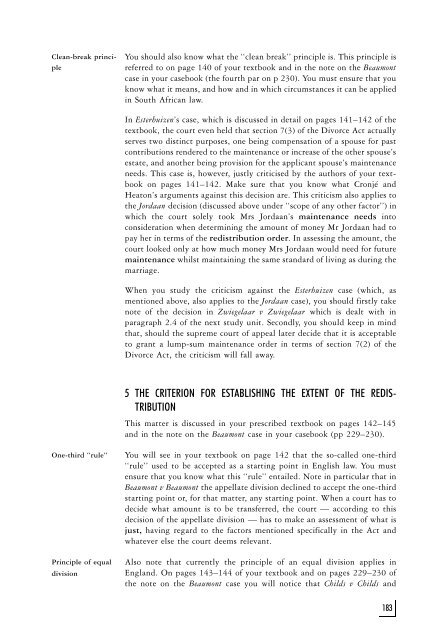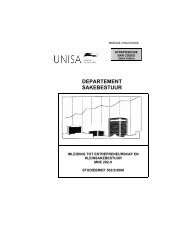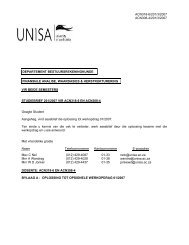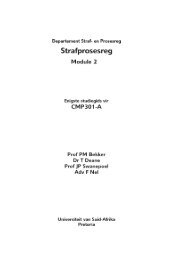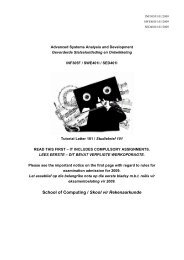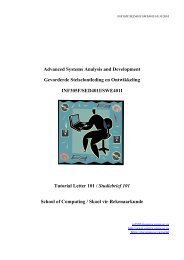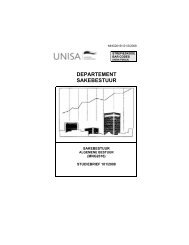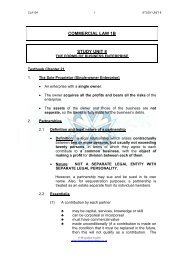key to the study guide - Name
key to the study guide - Name
key to the study guide - Name
Create successful ePaper yourself
Turn your PDF publications into a flip-book with our unique Google optimized e-Paper software.
Clean-break principle<br />
You should also know what <strong>the</strong> ``clean break'' principle is. This principle is<br />
referred <strong>to</strong> on page 140 of your textbook and in <strong>the</strong> note on <strong>the</strong> Beaumont<br />
case in your casebook (<strong>the</strong> fourth par on p 230). You must ensure that you<br />
know what it means, and how and in which circumstances it can be applied<br />
in South African law.<br />
In Esterhuizen's case, which is discussed in detail on pages 141±142 of <strong>the</strong><br />
textbook, <strong>the</strong> court even held that section 7(3) of <strong>the</strong> Divorce Act actually<br />
serves two distinct purposes, one being compensation of a spouse for past<br />
contributions rendered <strong>to</strong> <strong>the</strong> maintenance or increase of <strong>the</strong> o<strong>the</strong>r spouse's<br />
estate, and ano<strong>the</strong>r being provision for <strong>the</strong> applicant spouse's maintenance<br />
needs. This case is, however, justly criticised by <strong>the</strong> authors of your textbook<br />
on pages 141±142. Make sure that you know what Cronje and<br />
Hea<strong>to</strong>n's arguments against this decision are. This criticism also applies <strong>to</strong><br />
<strong>the</strong> Jordaan decision (discussed above under ``scope of any o<strong>the</strong>r fac<strong>to</strong>r'') in<br />
which <strong>the</strong> court solely <strong>to</strong>ok Mrs Jordaan's maintenance needs in<strong>to</strong><br />
consideration when determining <strong>the</strong> amount of money Mr Jordaan had <strong>to</strong><br />
pay her in terms of <strong>the</strong> redistribution order. In assessing <strong>the</strong> amount, <strong>the</strong><br />
court looked only at how much money Mrs Jordaan would need for future<br />
maintenance whilst maintaining <strong>the</strong> same standard of living as during <strong>the</strong><br />
marriage.<br />
When you <strong>study</strong> <strong>the</strong> criticism against <strong>the</strong> Esterhuizen case (which, as<br />
mentioned above, also applies <strong>to</strong> <strong>the</strong> Jordaan case), you should firstly take<br />
note of <strong>the</strong> decision in Zwiegelaar v Zwiegelaar which is dealt with in<br />
paragraph 2.4 of <strong>the</strong> next <strong>study</strong> unit. Secondly, you should keep in mind<br />
that, should <strong>the</strong> supreme court of appeal later decide that it is acceptable<br />
<strong>to</strong> grant a lump-sum maintenance order in terms of section 7(2) of <strong>the</strong><br />
Divorce Act, <strong>the</strong> criticism will fall away.<br />
5 THE CRITERION FOR ESTABLISHING THE EXTENT OF THE REDIS-<br />
TRIBUTION<br />
This matter is discussed in your prescribed textbook on pages 142±145<br />
andin<strong>the</strong>noteon<strong>the</strong>Beaumont case in your casebook (pp 229±230).<br />
One-third ``rule'' You will see in your textbook on page 142 that <strong>the</strong> so-called one-third<br />
``rule'' used <strong>to</strong> be accepted as a starting point in English law. You must<br />
ensure that you know what this ``rule'' entailed. Note in particular that in<br />
Beaumont v Beaumont <strong>the</strong> appellate division declined <strong>to</strong> accept <strong>the</strong> one-third<br />
starting point or, for that matter, any starting point. When a court has <strong>to</strong><br />
decide what amount is <strong>to</strong> be transferred, <strong>the</strong> court Ð according <strong>to</strong> this<br />
decision of <strong>the</strong> appellate division Ð has <strong>to</strong> make an assessment of what is<br />
just, having regard <strong>to</strong> <strong>the</strong> fac<strong>to</strong>rs mentioned specifically in <strong>the</strong> Act and<br />
whatever else <strong>the</strong> court deems relevant.<br />
Principle of equal<br />
division<br />
Also note that currently <strong>the</strong> principle of an equal division applies in<br />
England. On pages 143±144 of your textbook and on pages 229±230 of<br />
<strong>the</strong>noteon<strong>the</strong>Beaumont case you will notice that Childs v Childs and<br />
183


